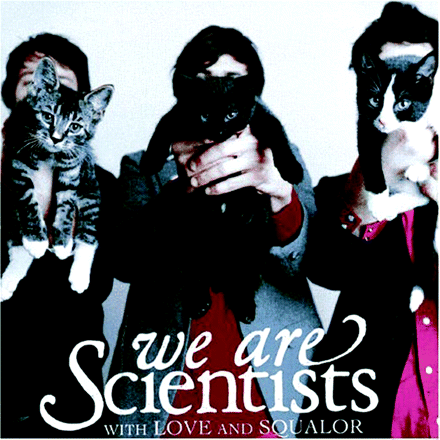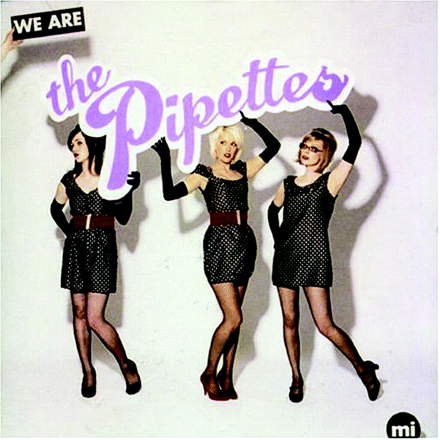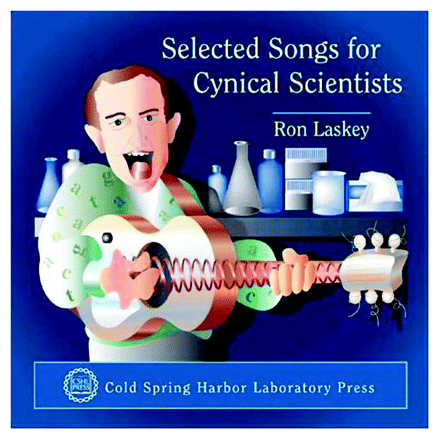Holiday Music Round-Up
- Dan Collinge, BA1 and
- John W. Nelson, PhD2
The Science of Squalor Or, Lovely Squalid Kittens

With Love and Squalor We Are Scientsts Audio CD Virgin 6981323 2006. $12.98
We Are Scientists’ debut CD steals its name from J.D. Salinger’s 1950 short story “For Esmé with Love and Squalor.” The story details the unusual relationship between Sergeant X, an American officer and aspiring writer stationed in England before D-day, and the precocious Esmé, who tells him she likes stories about squalor. Well, Esmé, there’s no shortage of it on this album. Scientists’ front man Keith Murray’s lyrics are boiling with youthful angst, frequent what-the-hell-am-I-doing-here sentiments, and a cynical, impure view of love, sex, and, well what’s the difference? With Love and Squalor might be the perfect title for an album where in just about every song, the singer wakes up drunk and confused and in a dysfunctional relationship. Which isn’t to say that it’s bad; it ain’t. It ain’t bad. It’s thirty-seven minutes of pure buzzing guitar-bloated indie/pop-punk semi-danceable self-love/loathing. With kittens. (The kittens deserve special mention for gracing the front and back covers and the liner notes.)
The album leads off with the herky-jerky “Nobody Move, Nobody Get Hurt.” Murray’s scratchy guitar precedes the disco bass thumps of Chris Cain and frantic drumming of Michael Tapper (yep, a drummer named Tapper). A few delightful “whoa oh oh oh ohs” and we hear Murray croon, “My body is your body,” and “If you want to use my body/ Go for it.” The sleaze of this proposal is somewhat tempered by the underlying sweetness of “This Scene is Dead,” the following track. “I’d really like to kiss you,” he sings, but unfortunately he’s apparently passed out on the floor of a bar somewhere. Still, the song ranks among the best cuts on the album—a successful melding of sing-along chorus, churning guitar, and poppy goodness.
Other highlights of Squalor include “Can’t Lose” and “The Great Escape.” The former is strong because of its varied tempo (a slow change-up from the pounding, shifty beats of the first three songs with a few splashes of tremolo guitar here and there); the latter is great because of its heavy distorted opening riff (not unlike mid-90s U2), and because the chorus successfully rhymes “idea” and “here.” Well, okay, it’s more like “ideeeya” and “heeeya.” The effort, though, is admirable. The lyrics throughout are nothing spectacular—maybe above average. They are clever-but-not-that-clever in a way that is reminiscent of OKGO. “It’s hard to rely on the rhythm section/When they’re all packing up/And they’re heading for the exit.” That’s kind of funny, and it’s also true!
Elsewhere, “It’s a Hit” sure sounds like it was written to be one, and “Textbook” could have been a Killers song with a little more synthesizer. Unfortunately, there’s little to distinguish the other songs, which are cut from the same slightly too indie to be pop-punk, slightly too radio-friendly to be indie mold. By the time the final tracks roll around they’ve more or less blended together.
Even so, there’s a lot of promise in the California trio’s debut, and it’s only slightly overwhelmed by the album’s total lack of restraint. What’s the point of having electric guitars if they aren’t screaming all the time? And why slow things down when they could be faster? The final analysis is that Squalor is a jumbled, enjoyable mess of beats, squeals, and whoas that points to a band with a lot of potential. Revolutionary it’s not. But does it have catchy hooks? Check. Chant-worthy choruses? Check. Adorable pictures of kittens? Oh yeah! —Dan Collinge
Musical Aspirations

We Are the Pipettes The Pipettes Audio CD Import Memphis Industries MI1041118, 2006. £19.99 (less expensive alternatives on-line)
(Phone rings.)
Promoter: Hello, Sam Bargin here. May I speak with John?
John: This is he. Who is this and what is this in regard to?
P: Well, John, have I got a CD for you to review!
J: (Slightly audible groan.) Here we go again. Look, I’m in the middle of editing a few articles and I really don’t have the—
P: Trust me, John. You’ll love this group and besides… there’s the “science” angle for your readers.
J: (Pregnant pause. Sigh.) I should know better but…go ahead. You’ve got two minutes.
P: Well, pal, this band is called…are you ready for this?... (Giggling.) The Pipettes!
J: (As if realizing a bad dream is, in fact, not a dream.) No!
P: Great name, huh? Instant appeal for scientists. Guaranteed to break the ice at parties. Let me tell you about them.
J: Wait a minute. “The Pipettes.” I think I’ve heard their CD recently. Isn’t their album called “Greeting From The Pipettes” or something equally clever?
P: (Triumphantly.) No, not even close! It’s “We Are The Pipettes.”
J: (Sarcastically.) Oh, sorry. My mistake. You’ve got one minute and forty-five seconds left, but I can tell you I’ve heard their CD a couple times. I was able to resist their charms.
P: John, baby, have a heart. They’re a tribute band to the Phil Spector type of musical production. You can tell the girls—there are three: Gwenno, RiotBecki, and Rose (pronounced ro zay′)—really like the old music that Spector produced and they have created a loving gift borne of their adulation.
J: Um, no. They’re a tribute alright. A tribute to never giving up on one’s dream, even when that dream is best forgotten. Have you heard, “It’s better to keep one’s mouth closed and make people wonder if you’re a fool than to open it and confirm their suspicions”?
P: Ouch…Are you telling me you didn’t like it? You didn’t groove to it?
J: (Guilty, feeling a need to explain.) Look. I didn’t like it because the bands Spector produced were better. If you like the Spector wall-of-sound treatment, you’re better off buying the original artists like The Ronettes, The Crystals, some Righteous Brothers, Ike and Tina…not a middling talent tribute. Why waste good money?
P: (Incredulous.) You’re telling me they’re not original?
J: How could they be?! They’re a tribute band! Tell me, which do you prefer, The Beatles or Beatlemania? In some moments, they remind me of early B-52s but without the irony or the talent. The fact is the music is catchy but the singers aren’t going to win any talent contests. Sort of like Bananarama. Remember “Venus,” “Cruel Summer,” “Robert De Niro’s Waiting”? Catchy music; less than wonderful singing. (Trying to offer some conciliation). I’ll give them this.
P: What? (Desperate for a good tag line but distrustful and a bit dejected.)
J: It’s interesting to hear Girl Power post-feminism in such retro music. “Your Kisses Are Wasted On Me,” “Because It’s Not Love,” and “ABC,” for example.
P: That’s it?
J: Yep. The CD might work as a gag gift for a bench jockey, but if you like the Phil Spector sound, stick with the originals. Your two minutes are up. —John W. Nelson
Shared Frustrations Or, He Doth Not Protest Enough, Methinks

Selected Songs for Cynical Scientists Ron Laskey Cold Spring Harbor Laboratory Press 2003. $18.00 ISBN: 0879696850
Sung to the music of “Maria” from West Side Story: Urea/I just poured a gel with urea/and suddenly the liquid leaked out a crack on to me….
Yes, who hasn’t—in the obscenely late night in the hour between dog and wolf—created extemporaneous, corny lyrics to popular songs to pass the time, to defeat boredom, to reassure oneself that, while at the bench, the late-night experiment is time well spent? Even I admit to it, but none of us really takes the time to polish our new stanzas, let alone develop them into full-length doggerel. And then, if one does take the time, what does one do with them? These are no more than aborted inventions that one wouldn’t share with colleagues or others. Surely, only a handful of such songs has been recapitulated at some departmental retreat where the captive audience of post-docs and grad students winces appreciatively, because if not, some invisible hand of the departmental hierarchy will sabotage their embryonic careers. Ah, the stuff of research job-insecurity that breeds paranoia, but I digress….
I do like Tom Lehrer and I do like folk music. Music with a message is worth the time to hear. Songs of clever cynicism, maybe less so. Thus, I was less than thrilled to have Ron Laskey’s Selected Songs for Cynical Scientists land on my desk. I hate love-me-I’m-witty songs; however, as a service to you, dear reader, I prepared myself for the great sacrifice of listening to and reviewing the CD at hand. Fortunately, the anticipation of sacrifice was less than that actually experienced. Ron Laskey, at the Medical Research Council Cancer Cell Unit, Cambridge University, has collected on this compilation sixteen songs (from two concerts in 1991 and 1995) that describe being scooped, problems with slide presentations, international travel (“Airport Allergy”), gels run too long and unbalanced centrifuge rotors (“Cells and Gels”), and time-eating committees, to name but a few topics. Every scientist will find several songs that describe their own experiences, previous or contemporary. I’ll leave it to you to figure out who “Big Ben in Boston” refers to. These songs are clever without falling into preciousness.
Laskey has been at this for a long time, referring to his adoration of Paul Simon in 1965 (“The Joys of Singing”), playing guitar and singing protests and exhortations for a better world. In fact, the last three songs change the tenor of the evening completely. Following the encomium to Simon, “Songs of Innocence and Truth” is a bittersweet look back to the power of protest and the feeling that music could bring the world together, opening our eyes to a collective truth and a hopeful way forward. The loss of innocence is revealed in Laskey’s voice as 1960s idealism died, owing to indifference and opposition.
Laskey has a voice and styling suitable for folk music and sea shanties and reminds me, by turns, of Ralph McTell, Roger Whittaker, and Liam Clancy. In fact, I can easily envision the tune to “Cells and Gels” used with new lyrics that recall such folk mainstays as the horror of war (“Johnny We Hardly Knew Ye”) or social outcasts (“Streets of London”)—music that makes you stare into your pint as you examine your conscience and humanity’s collective one.
As if to offer some relief from the wet-velvet heaviness of these two songs, Laskey closes with a traditional drinking song, “The Barley Mow,” a tour de force of memorization and rapid-fire speech whereby the growing recitation must be said in one breath without stumbling over the words; otherwise, the hapless soul has to drink a pint (or some other amount) in one draught. Having witnessed the Irish Rovers perform this song in concert, I can attest to its ability to bring a crowd to its feet; it’s no wonder Laskey chooses this to close his concert. One particular thing on the CD caught my ear. If you have ever heard an unprepared lecturer “um” many times, you find yourself anticipating the next utterance of “um” as the rest of the lecture dissolves from importance. Laskey says the word “slowly” so many times (alas, I haven’t counted) that one could easily make a drinking game of it: “OK, every time he says ‘slowly,’ we have a take a drink.” Or, “Each time he says ‘slowly,’ only the one who points it out first doesn’t have to drink.” A word of caution: make it a sip instead of an entire beverage, otherwise you’ll be in no shape to drive, unless you imbibe soft drinks.
After hearing this collection, I gained an appreciation for the significant effort involved in crafting full-length lyrics and new music into cynical songs, as opposed to forcing silly lyrics on top of well-known melodies. Laskey is quite talented in his musings on scientific disappointments; however, it is the last three songs that seal this deal. It makes me wish he had also cut a folk album. Now if I could only find my copy of Liege and Lief or John Barleycorn Must Die…. —John W. Nelson
- © American Society for Pharmacology and Experimental Theraputics 2006



